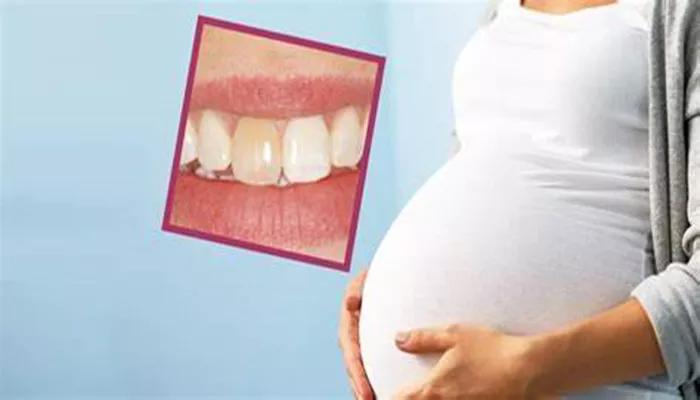Pregnancy is a time of significant change and careful consideration for expectant mothers. With various aspects of daily life needing reassessment to ensure the health and safety of both the mother and the unborn child, personal care products and treatments are often scrutinized. One common concern among pregnant women is whether certain cosmetic treatments, such as teeth whitening, are safe during pregnancy. Specifically, many wonder if using teeth whitening strips, a popular over-the-counter solution for achieving a brighter smile, poses any risks. This comprehensive article explores the safety of using teeth whitening strips during pregnancy, considering both potential risks and expert recommendations.
Understanding Teeth Whitening Strips
Teeth whitening strips are a popular choice for individuals looking to enhance their smile at home. These strips are coated with a whitening gel that contains active ingredients, typically hydrogen peroxide or carbamide peroxide. When applied to the teeth, the gel works to break down stains and discoloration, leading to a whiter appearance.
How Teeth Whitening Strips Work
Teeth whitening strips are designed for ease of use. Users apply the strips to their teeth for a specified duration, usually ranging from 30 minutes to an hour, depending on the product. The whitening agent in the gel penetrates the enamel and oxidizes stains, resulting in a lighter shade of teeth.
SEE ALSO: What Is The Best Product to Whiten Your Teeth?
Safety Concerns During Pregnancy
Pregnancy requires careful attention to health and safety due to the potential effects of substances and treatments on both the mother and the developing fetus. The following sections address the specific concerns related to using teeth whitening strips during pregnancy.
1. Active Ingredients in Whitening Strips
The primary active ingredients in teeth whitening strips are hydrogen peroxide and carbamide peroxide. Both are effective in removing stains but can also pose risks if used improperly. Concerns about their safety during pregnancy arise from their potential to be absorbed into the bloodstream and reach the fetus.
Hydrogen Peroxide: This compound is known for its strong bleaching properties. However, high concentrations or excessive use can lead to irritation of the gums and oral tissues. The safety of hydrogen peroxide in high doses or long-term use during pregnancy remains uncertain.
Carbamide Peroxide: Carbamide peroxide breaks down into hydrogen peroxide when applied, offering a gradual whitening effect. It is generally considered less aggressive than hydrogen peroxide but still requires careful use.
2. Absorption and Systemic Effects
The concern with any chemical exposure during pregnancy is whether it can be absorbed into the bloodstream and potentially affect the developing fetus. While the amount of whitening agent that might be absorbed through the gums is relatively low, the lack of extensive research on the systemic effects of these chemicals during pregnancy warrants caution.
3. Potential Risks to Oral Health
Pregnancy can bring about changes in oral health, including increased sensitivity and a higher risk of gum issues. Teeth whitening strips may exacerbate these conditions by causing additional sensitivity or irritation. Pregnant women may already experience heightened gum sensitivity, making the use of whitening strips potentially uncomfortable or harmful.
Expert Recommendations And Guidelines
When it comes to using teeth whitening products during pregnancy, dental and medical professionals often advise erring on the side of caution. Here are some key recommendations:
Consult a Healthcare Provider: Before starting any teeth whitening regimen during pregnancy, it is crucial to consult with a healthcare provider or dentist. They can provide personalized advice based on an individual’s health status and the specifics of their pregnancy.
Opt for Professional Advice: Dental professionals may recommend avoiding over-the-counter whitening products during pregnancy. Instead, they might suggest alternative methods for maintaining oral health and appearance that do not involve potentially harmful chemicals.
Consider Natural Alternatives: Pregnant women concerned about their dental appearance might explore natural alternatives to commercial whitening products. Maintaining good oral hygiene, using fluoride toothpaste, and regular dental cleanings can help manage tooth discoloration without introducing additional risks.
Follow Manufacturer Guidelines: If a healthcare provider approves the use of teeth whitening strips, it is essential to follow the manufacturer’s instructions carefully. Avoiding excessive use and adhering to recommended durations can help minimize potential risks.
Conclusion
While teeth whitening strips are a popular and convenient option for achieving a brighter smile, their use during pregnancy requires careful consideration. The active ingredients in these products, such as hydrogen peroxide and carbamide peroxide, have the potential to cause irritation or discomfort, and their systemic effects on the developing fetus are not well-studied. For expectant mothers, the safest approach is to consult with healthcare professionals before using any whitening products.
They can provide tailored advice and recommend safer alternatives if necessary. Maintaining good oral hygiene and exploring non-chemical methods for managing tooth discoloration can help ensure both maternal and fetal health during this crucial time.

